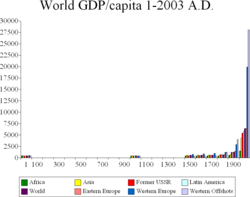This is an old revision of this page, as edited by Ultramarine (talk | contribs) at 12:25, 20 January 2007. The present address (URL) is a permanent link to this revision, which may differ significantly from the current revision.
Revision as of 12:25, 20 January 2007 by Ultramarine (talk | contribs)(diff) ← Previous revision | Latest revision (diff) | Newer revision → (diff)








- Many forms of Government have been tried, and will be tried in this world of sin and woe. No one pretends that democracy is perfect or all-wise. Indeed, it has been said that democracy is the worst form of government except all those other forms that have been tried from time to time.
- Sir Winston Churchill
- Many forms of Government have been tried, and will be tried in this world of sin and woe. No one pretends that democracy is perfect or all-wise. Indeed, it has been said that democracy is the worst form of government except all those other forms that have been tried from time to time.
- The death of democracy is not likely to be an assassination from ambush. It will be a slow extinction from apathy, indifference, and undernourishment.
- Robert Maynard Hutchins
- The death of democracy is not likely to be an assassination from ambush. It will be a slow extinction from apathy, indifference, and undernourishment.
- Information is the currency of democracy
- Thomas Jefferson
- Information is the currency of democracy
My own POV is that liberal democracy and capitalism overall are beneficial. However, there are of course many opposing arguments and I have tried to include the views of both sides in order to achieve NPOV. I believe that the capitalist system must include policies redistributing wealth from the most wealthy, since it is easier for the already wealthy to gradually accumulate more wealth than it is for the poor to gain any wealth. Therefore, relatively high progressive taxation, wealth tax, and/or inheritance tax.
I strongly believe in the fundamental Misplaced Pages policies Misplaced Pages:Verifiability, Misplaced Pages:No original research, and Misplaced Pages:Neutral point of view. In particular, I like to read and support what I write with peer-reviewed articles and academic press.
Political and economic freedom increases happiness
Democracy is good
No wars and no conflicts causing any battle deaths between liberal democracies.(See Never at War and Democratic peace theory) Little democide, corruption, and few civil wars. No liberal democracy has had a large scale famine. More democratic nations have higher average self-reported happiness.(See Liberal democracy)
Capitalism is good
The Index of Economic Freedom is way to measure the degree of capitalism in different nations. More capitalist nations have less poverty. Note that also nations with high progressive taxation, like Sweden, can be very capitalist. See also Ease of Doing Business Index and Global Competitiveness Report.
Globalization = the world is getting better
- The percentage of people in developing countries living below US$1 (adjusted for inflation and purchasing power) per day has halved in only twenty years .
- Life expectancy has almost doubled in the developing world since WWII and is starting to close the gap to the developed world where the improvement has been smaller. Child mortality has decreased in every developing region of the world . Income inequality for the world as a whole is diminishing .
- Democracy has increased dramatically from almost no nation with universal suffrage in 1900 to 62.5% of all nations in 2000 .
- The proportion of the world's population living in countries where per-capita food supplies are under 2,200 calories (9,200 kilojoules) per day decreased from 56% in the mid-1960s to below 10% by the 1990s.
- Between 1950 and 1999, global literacy increased from 52% to 81% of the world. Women made up much of the gap: Female literacy as a percentage of male literacy has increased from 59% in 1970 to 80% in 2000.
- There are similar trends for electric power, cars, radios, and telephones per capita, as well as the proportion of the population with access to clean water .